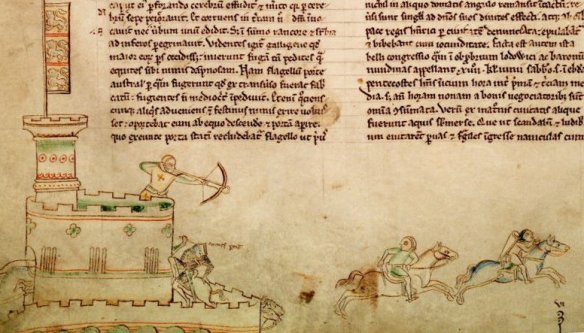A 13th-century depiction of the Second Battle of Lincoln, which occurred at Lincoln Castle on 20 May 1217; the illustration shows the death of Thomas du Perche, the Comte de la Perche.
Barons force King John to sign Magna Carta. King John was neither loved nor respected by the majority of his countrymen during his 17-year reign (1199-1216).His military endeavors, which included campaigns in France, Scotland, Wales, and Ireland, necessitated high taxes. These financial burdens, combined with John’s dictatorial and often unpredictable style of ruling, led to widespread disenchantment among many of his barons. During the summer of 1214 John made a determined but unsuccessful effort to regain his French territories, only to return to England, short of finances, to face a baronial rebellion.
Refusing John’s offer of arbitration, the barons captured London in April 1215 without resistance, and John had to evade the baronial force of 2,000 knights for two months as it followed him around the south of England. On 15 June, the two sides met at Runnymede and negotiated the Magna Carta, a document that conceded most of the baronial demands and limited the king’s exclusive right to govern. John had no intention of abiding by its terms. He viewed the charter as providing a breathing space while he assembled a more formidable military force. Heavily dependent on borrowed money and hired mercenaries, John resumed hostilities in September 1215.
John’s problems were exacerbated when Louis, the French king’s son and heir, arrived in England (21 May 1216) at the invitation of the rebel barons. In what must count for one of the least known events in English history, Louis was welcomed by the citizenry of London, and crowned king of England. Emboldened by such obvious domestic support, his large army, which is believed to have numbered 35,000 at its peak, began driving the royal forces westward.
Shortly afterwards, on 23 October 1216, John died at Newark and was succeeded by his nine-year-old son, Henry III, who proved a more popular figurehead than his father. The primary responsibility for conducting the war now fell on the two regents, William Marshal and Hubert de Burgh. Marshal proved himself a shrewd diplomatist and strategist, winning the allegiance of many of the dissident barons. When Lord Fitzwalter raised a rebel army of 600 knights and 20,000 French soldiers, Marshal astutely retreated to Nottingham and waited for reinforcements. When he enjoyed numerical superiority, he laid siege to the rebel stronghold of Lincoln Castle, and secured a decisive royalist victory (23 May). This defeat, combined with the repulsion of the French naval fleet off Sandwich in Kent, forced Louis to accept peace terms. In return for a payment of 10,000 marks, the French dauphin agreed to waive his claim to the English throne and to restore Normandy. Neither promise was fulfilled.
Although Henry went on to rule England until 1272, the issue of regal versus baronial rights was never satisfactorily resolved during his reign. The most enduring legacy of the civil war was undoubtedly the Magna Carta, which inspired supporters of individual freedom long after the memory of the rebel barons had faded.
References and further reading: Bartlett, Robert. England under the Norman and Angevin Kings, 1075-1225. Oxford, UK: Oxford University Press, 2000. Warren, W. L. King John. New Haven and London: Yale University Press, 1997.
